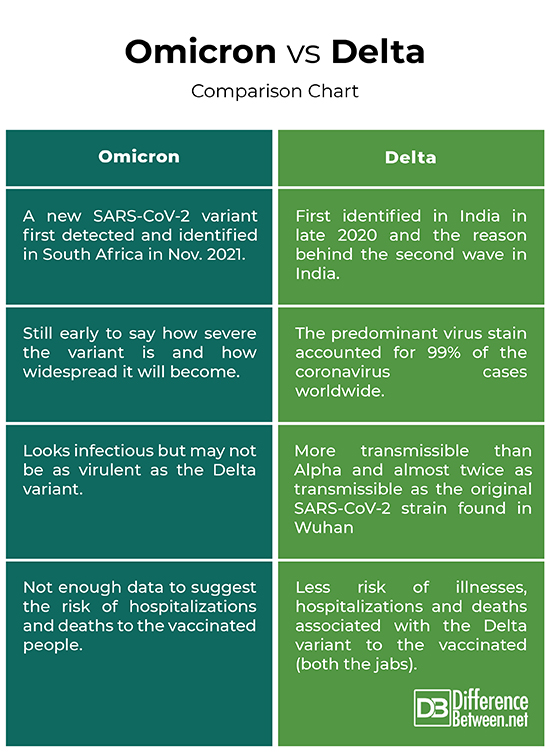Difference Between Omicron and Delta
Every day you pick the newspaper or read the news, there’s something new, like the new variants of the COVID-19 keep piling up universally with some sources proposing that they could prompt a more rapid spread of the virus than their predecessor variants. Different variations have been witnessed since the pandemic broke out in 2020 with the first confirmed case being identified in late 2019. It’s almost the end of 2021 and we have a new SARS-CoV-2 variant that is becoming a concern. Well, it’s still too early to jump to any conclusions regarding how severe or contagious it is. Let’s see how Omicron is different than the Delta variant.

All about Omicron
Omicron, also known as B.1.1.529, is a new SARS-CoV-2 variant first detected and identified in South Africa on 24 Nov. 2021. The new lineage reportedly has a whopping 30+ mutations in the spike protein alone, because of which the WHO designated Omicron as a “variant of concern.” Researchers in South Africa first detected this new variant in specimens collected from Botswana on 11 Nov. 2021 and from South Africa on 14 Nov 2021. Since then, the researchers from all over the world have been vigilant, which prompted concern among scientists and health officials, and also people. The first case of Omicron was reported in the United States on 1 Dec. 2021 in a returnee from South Africa. However, it’s still early to say how severe the variant is and how widespread it will become. Although not conclusive, but there are studies that suggest vaccines will be less effective against Omicron.

How about Delta
The Delta (B.1.617.2) variant is a highly contagious SARS-CoV-2 virus strain that was first identified in India in late 2020. The deadly second wave in India that brought the whole nation to chaos was attributed to the Delta variant. The Delta variant was named on 31 May 2021 and had spread to more than 179 countries by November 2021. It swept rapidly through the country and Great Britain before making its way to the United States, where it saw a massive surge. The Delta variant is now the predominant SARS-CoV-2 virus stain that was accounted for almost 99% of the coronavirus cases worldwide. Delta is not like any other variants previously witnessed. Full vaccinated people are less likely to experience any serious effects, but for people who are not fully vaccinated, that is of high concern.
Difference between Omicron and Delta
Contagiousness
– The Delta variant is by far the most contagious SARS-CoV-2 virus strain ever witnessed since the pandemic broke out. First identified in late 2020 in India, the Delta variant is reportedly 40-60% more contagious than the Alpha variant, the one which was originally linked to the United Kingdom. The Delta variant is now the predominant SARS-CoV-2 virus stain that was accounted for almost 99% of the coronavirus cases worldwide. Early reports from South Africa suggested that the new Omicron variant could be more contagious than the previous variants and may spread more easily because of the high number of mutations present in the spike protein.
Severity
– Data suggest that Delta is mote transmissible than Alpha and almost twice as transmissible as the original SARS-CoV-2 strain found in Wuhan. Within months, Delta had spread to more than 179 countries causing a mass panic. It is a highly infectious virus which was the primary reason behind the fatal second wave in India which had severe consequences in the form of spiraling cases and mounting deaths nationwide. The Omicron looks to be highly infectious but may not be as virulent as the Delta variant. The preliminary reports do not say anything concrete about its severity. Because of the small number of cases, the current severity of illness and death associated with the variant remains unclear.
Risks to the Vaccinated
– People who are full vaccinated and later contract the Delta variant are less likely to spread the virus. There are less risks of illnesses, hospitalizations and deaths associated with the Delta variant to the vaccinated (both the jabs). Unvaccinated people, however, remain a great concern. In case of Omicron, there is not enough data that suggest that this new variant would fully evade the sidestep protections provided by the current COVID-19 vaccines in circulation. Vaccines are still critical in reducing severe illnesses and deaths. However, the survivors from the previous infections are more likely to be re-infected with the new Omicron variant, data suggests.
Tests
– The cases of the new Omicron variant are rising in South Africa with new cases, although in small numbers, keep piling up every day. A booster shot of the Pfizer COVID-19 vaccine is proved to provide strong protection, at least in the short term, a data from Israel suggested. Two types of tests are still effective to diagnose current infection: nucleic acid amplification tests (NAATs) and antigen tests. The widely used RT-PCR tests remain a dominant method of testing and detecting COVID-19 infections, including infection with Omicron. However, studies are ongoing to determine if there is going to be any impact on other testing methods.
Omicron vs. Delta: Comparison Chart

Summary
Well, the current studies and the signs suggest that the new Omicron variant is certainly concerning with a high risk of infection, but the data also suggests it may not be as virulent or pathogenic as the Delta variant. In general, it’s still too early to make any claims regarding the severity and contagiousness of the Omicron variant. However, Omicron has some unique mutations, more than any other previous variants, including the Delta, which suggests that it has a high degree of transmissibility. Data also suggests that Omicron might be more contagious but less severe than the Delta variant.
- Difference Between Caucus and Primary - June 18, 2024
- Difference Between PPO and POS - May 30, 2024
- Difference Between RFID and NFC - May 28, 2024
Search DifferenceBetween.net :
Leave a Response
References :
[0]Rendall, Jessica. “Omicron in the US: How the new COVID variant compares to delta.” CNET, 7 Dec. 2021, www.cnet.com/health/medical/omicron-in-the-us-how-the-new-covid-variant-is-different-from-delta.
[1]Lapid, Nancy. “Omicron may raise re-infection risk; booster protection documented.” Reuters, 7 Dec. 2021, www.reuters.com/business/healthcare-pharmaceuticals/omicron-may-raise-re-infection-risk-booster-protection-documented-2021-12-06.
[2]Chutel, Lynsey. “Omicron Is Fast Moving, but Perhaps Less Severe, Early Reports Suggest.” The New York Times, 6 Dec. 2021, www.nytimes.com/2021/12/06/world/africa/omicron-coronavirus-research-spread.html.
[3]Callaway, Ewen and Heidi Ledford. “How bad is Omicron? What scientists know so far.” Nature, 2 Dec. 2021, www.nature.com/articles/d41586-021-03614-z.
